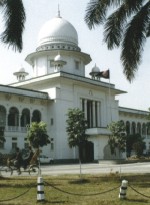Judges
Grow Older and the Photo-finish
Ahmede
Hussain
The
14th Constitution Amendment Bill was passed on May 17 with much
funfair by the parliament by 226-1 division vote. But some of
the changes to the Constitution have given rise to growing scepticism.
The
amendment to the Constitution came at a moment when the BNP-led
Four-party Alliance government was just half way through its
five-year term; when the alliance's failure to reign in rising
inflation and corruption has never been so obvious.
 Under
the second constitution amendment in eight years, 45 reserved
seats will be filled in for the remaining tenure of the current
eighth parliament on a proportional basis. "The provision
on 45 reserved seats," according to the amendment, "will
remain effective for 10 years from the sitting date of the ninth
parliament." Another major provision under the change was
the mandatory display of the portraits of the president and
the prime minister. The new law also raises the retirement age
of the Supreme Court judges to 67 from 65.
Under
the second constitution amendment in eight years, 45 reserved
seats will be filled in for the remaining tenure of the current
eighth parliament on a proportional basis. "The provision
on 45 reserved seats," according to the amendment, "will
remain effective for 10 years from the sitting date of the ninth
parliament." Another major provision under the change was
the mandatory display of the portraits of the president and
the prime minister. The new law also raises the retirement age
of the Supreme Court judges to 67 from 65.
The amendment
has drawn widespread criticism from the main opposition. Terming
it illegal and contrary to the basic spirit of the Constitution,
Awami League president Sheikh Hasina told a daily, "It
was not necessary at all. I don't know whether there is any
country in the world that has a law or constitutional provision
for displaying portraits of the president and the prime minister."
I was also the prime minister. But I did not ask to hang my
portrait; I did not want it, she points out. The amendment,
in fact, when first tabled, did not seek to display the portraits
of the president and prime minister in the government offices.
Many believe, the law was enacted to prevent the display of
Sheikh Mujib's portrait from government offices.
The bill
that was passed in the afternoon of May 17 had every element
of an Elizabethan comedy. And it was not all-good at the Jatiya
Party (JP-Ershad) camp. Since its introduction to the parliament,
JP MPs denounced the bill terming it a black law. Some even
submitted notice for eliciting public opinion and amendment
proposals on the bill, a newspaper report says. But, as reports
suggest, the apparently rebellious JP was snubbed when the government
threatened to put their leader behind bars in over a dozen cases
pending against him.
 "According
to the party decision, the chairman (HM Ershad) demanded the
withdrawal of the bill on May 13. I do not know of any new decision
overruling the previous one. The party chairman also told me
in the morning that the decision has not been changed,"
Golam Mohammad Kader, a JP MP, told the Daily Star. "The
lawmakers who voted in favour of the bill violated the party's
decision on the issue as it decided earlier to oppose the bill
and it has not that decision," continued Kader, who with
another fellow JP legislator skipped parliament proceedings
protesting his party's flip-flopping.
"According
to the party decision, the chairman (HM Ershad) demanded the
withdrawal of the bill on May 13. I do not know of any new decision
overruling the previous one. The party chairman also told me
in the morning that the decision has not been changed,"
Golam Mohammad Kader, a JP MP, told the Daily Star. "The
lawmakers who voted in favour of the bill violated the party's
decision on the issue as it decided earlier to oppose the bill
and it has not that decision," continued Kader, who with
another fellow JP legislator skipped parliament proceedings
protesting his party's flip-flopping.
The increase
in the retirement age of the judges has fallen in line of criticism
too. Deputy Leader of the Opposition Abdul Hamid alleged that
the new law was being enacted with a partisan intention. "They
want to put a man of their choice as the head of the caretaker
government. It is a design by the BNP-Jamaat alliance to manipulate
the next general election," Hamid told the journalists.
In fact, the new amendment means, the incumbent Chief Justice
KM Hasan will be the chief of the caretaker government when
the government finishes its term in 2006. What makes people
more suspicious is the fact that Hasan used to be a member of
the BNP before his appointment as a high court judge.
Observers
fear the retirement age was also raised to maintain the status
quo in the Sheikh Mujib murder case. Because as all of the sitting
judges have felt embarrassed, it will become practically impossible
to try Mujib's killers before 2007. It is quite turbid to the
general people as to why the BNP has been trying to save the
self-confessed killers of Bangabandhu. "The government
has passed the bill considering the ruling parties' interest,
not the interest of the common people," Hasanul Haque Inu,
Jatya Shamajtantrik Dal leader, says.

 Under
the second constitution amendment in eight years, 45 reserved
seats will be filled in for the remaining tenure of the current
eighth parliament on a proportional basis. "The provision
on 45 reserved seats," according to the amendment, "will
remain effective for 10 years from the sitting date of the ninth
parliament." Another major provision under the change was
the mandatory display of the portraits of the president and
the prime minister. The new law also raises the retirement age
of the Supreme Court judges to 67 from 65.
Under
the second constitution amendment in eight years, 45 reserved
seats will be filled in for the remaining tenure of the current
eighth parliament on a proportional basis. "The provision
on 45 reserved seats," according to the amendment, "will
remain effective for 10 years from the sitting date of the ninth
parliament." Another major provision under the change was
the mandatory display of the portraits of the president and
the prime minister. The new law also raises the retirement age
of the Supreme Court judges to 67 from 65.  "According
to the party decision, the chairman (HM Ershad) demanded the
withdrawal of the bill on May 13. I do not know of any new decision
overruling the previous one. The party chairman also told me
in the morning that the decision has not been changed,"
Golam Mohammad Kader, a JP MP, told the Daily Star. "The
lawmakers who voted in favour of the bill violated the party's
decision on the issue as it decided earlier to oppose the bill
and it has not that decision," continued Kader, who with
another fellow JP legislator skipped parliament proceedings
protesting his party's flip-flopping.
"According
to the party decision, the chairman (HM Ershad) demanded the
withdrawal of the bill on May 13. I do not know of any new decision
overruling the previous one. The party chairman also told me
in the morning that the decision has not been changed,"
Golam Mohammad Kader, a JP MP, told the Daily Star. "The
lawmakers who voted in favour of the bill violated the party's
decision on the issue as it decided earlier to oppose the bill
and it has not that decision," continued Kader, who with
another fellow JP legislator skipped parliament proceedings
protesting his party's flip-flopping.